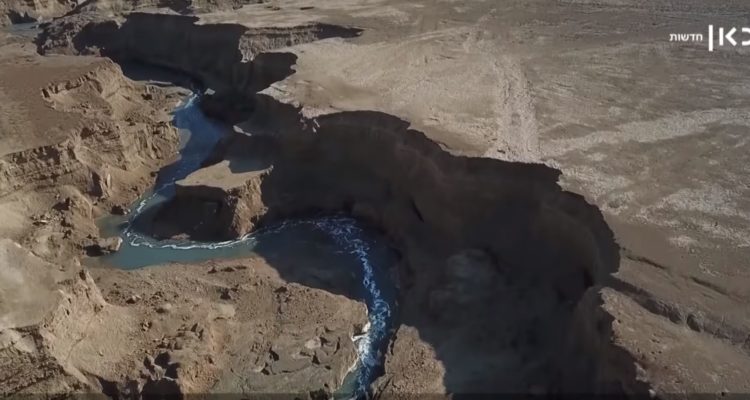A company’s self-interest, the danger of mines, and official disinterest seemingly combined to keep a beautiful natural phenomenon from the public.
By Batya Jerenberg, World Israel News
In a follow-up report to its revelation Monday night that a large, beautiful river has been flowing in Israel unbeknownst to the public, Israel’s Channel 11 enumerated some of the reasons that the secret was kept so well for so many years.
The first answer is a logical one: It’s difficult to access.
The land on the way to the site is full of sand and mud emanating from the Arava River that happens to be full of mines.
The region to the west of Route 90, which borders Jordan, is known to be seeded with these explosives from the earliest days of the state. Risking one’s life to see another part of the country that doesn’t look particularly inviting from the road is not something even the most avid of trekkers are willing to do.
In addition, the area is full of sinkholes, making it even more difficult and dangerous to drive to the site.
The purposeful hiding of the river may have also played a role. The Dead Sea Works, a unit of Israel Chemicals Ltd., which owns the concession to the area, was not forthright, according to Oren Aharoni, the reporter who is now releasing more information about the story he broke Monday night.
The environmental survey the company submitted to the National Planning Commission when it asked for permission to dig in the area claimed that there was nothing there, he reported.
“They wrote that … there’s a small ditch, a bit of mud – certainly no impressive wonders of nature like what you can see in our report,” he said.
The authorities accepted the company’s word, and there was no oversight when Dead Sea Works began to do with it as it pleased. This included a lot more digging – and destroying, according to Aharoni – than what the local regional council gave it permission for.
But even here, he said, it’s not clear exactly what work was approved, because there is no relationship between the route that was damaged and the route that the National Infrastructure Commission had allowed.
In addition, Makor Rishon wrote last week that Jordanian contractors are working in the area. According to the Dead Sea Works, whatever they are doing is with full coordination with the relevant authorities.
The regional council maintains that the army gave its permission. When asked, the IDF’s reply was simply that “The activity was known to the military.”
However, Channel 11 reported on Tuesday evening that the Jordanians are working in an area that is in a ‘no man’s land’ and is in fact beyond their own border. A long stretch of torn up ground abutting the river’s canyon caused by the Jordanians can be seen from the air.
Geologist Lior Anmar, one of the first Israelis to discover the river, pointed to a collapsed section of the river’s canyon and suggested the destruction may have been caused by the Jordanian project.
What work is being done, who authorized it, and who is supervising it to ensure that it follows the national plan for the region are questions that as yet have no answers, said the report.
Blue and White MK Miki Haimovitz has formally asked the Minister of Finance to explain how permission was granted for work to be done on the site without checking it, and if in light of the TV report, he intends to end the Dead Sea Work’s concession to work the site.





